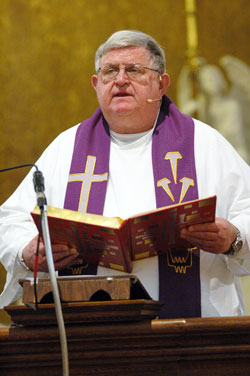Conventual Franciscan serves home parish in Terre Haute

Conventual Franciscan Father Joel Burget proclaims the Gospel during Mass on March 22 at St. Benedict Church in Terre Haute. He served as a missionary priest in Zambia for 23 years.
(File photo by Mary Ann Wyand)
(Editor’s note: In conjunction with the Year for Priests, The Criterion is publishing a monthly feature titled “Faithful Fathers.” We plan to profile a priest from each deanery during the next nine months.)
By Mary Ann Wyand
Conventual Franciscan Father Joel Burget is the pastor of St. Benedict Parish in Terre Haute.
He was ordained to the priesthood in 1966 and is 70. Born and raised in Terre Haute as a member of St. Benedict Parish, he also served as a missionary priest in Zambia from 1966 until 1989.
Love for his home parish—“My family has been here since the 1840s. My great-grandfather was one of the founding fathers of St. Benedict Church. … We grew up right down the street. My brother and I used to come and serve Mass. We all went to school here. We were very close to the Church in everything that we did. Our church holds so many childhood memories for me.”
Early call to a vocation—“We’ve always had the Franciscan presence here. The Franciscans have been here since 1872. Originally, it was a Benedictine church, but they could no longer care for it so the Franciscans took it over in 1872.
“I’ve been associated with Franciscans all my life. I never really thought much about the priesthood until I was in the seventh grade.
“A missionary priest visited from Zambia. [The Conventual Franciscans] had missions in Zambia at that time. I got to know him, and was enthralled with the stories he would tell me about the poor people in Africa and how he was ministering to them. I decided that was what I wanted to do.
“When I got to the eighth grade, I wrote a letter to the [Franciscan] provincial at Mount St. Francis in southern Indiana, and asked to go to high school there to have some discernment about my vocation.
“After high school, I stayed on and went to the novitiate then entered the major seminary [the former Assumption Seminary near Minneapolis] and did my bachelor’s program there. At the same time I was doing my theological studies, I did a master’s program in geography because there was an opening at St. Francis College in Zambia. They were looking for a geography master. After college, I went [to Zambia]. I stayed there until September of 1989 when I came back to the states.”
Hospital chaplaincy—“I went into hospital chaplaincy and worked for nearly 10 years [from 1989 to 1998] as the director of pastoral care at St. Mary’s Hospital in Centralia, Ill. The hospital is operated by the Felician sisters out of Chicago. I stayed there as director of pastoral care until the provincial called me and said I needed to come back to Terre Haute because they needed a pastor there.”
Homecoming—“I never expected to come back to my hometown. I had left at age 13, but many of my relatives were still here. So I took the position and will have been here 12 years on the third Sunday of Easter in 2010. … It’s a holy place for me because that’s where my vocation was formed, and we had all of our catechetical instruction there. We were taught by the Sisters of Providence.”
Gratitude for his ministry—“[The provincial] assigned me to minister to my own people, and pay back where my vocation came from. It’s a very holy time for me, and I enjoy it very much. We have many ministries that reach out to help the poor, [including] a soup kitchen. It’s not Africa, but we are ministering to the people around us.”
Sister also answered God’s call to ministry—“I have two sisters. One of my sisters, Providence Sister Ann Brendan Burget, started the day care center at Saint Mary-of-the-Woods.”
God’s plan for his life—“If I would have planned [my religious vocation] myself, it never would have turned out as well. God has a way of making things happen.”
Life as a Conventual Franciscan—“Our Franciscan charism always has been reaching out to the poor. We’ve always been associated with those who have less, and that’s why we’re called the Lesser Brothers. … Our philosophy is to serve people who have little or less or nothing.
“We live in community, where all the members share the tasks and duties of ordinary living. Our order is somewhat contemplative, but it’s also very much an active life where we serve people.”
Future plans for the friars—“Last week, we were down at Saint Meinrad [Archabbey] for meetings. We had our regional assembly. We had 103 friars there that are planning the future [for the members of the province] for the next few years. We’ll have new assignments given to us in 2010 when we have our chapter meeting.”
Ministry support—“The Scriptures are so alive to me. In Africa, it was much different because you had to work all the time translating, and here … I don’t have to translate my homilies to a different language and see if I got the nuances right. The Scriptures are what I base my [priestly] ministry on.”
Why he enjoys the priesthood—“I like being a priest, but more especially I like being a Franciscan priest because we do not minister alone. We’re always together in community, bonding together, working together, playing together and praying together. There’s a lot more intensity in our community life, which gives us more stability in our active ministry. … When we come home, we have another life together. It’s not all just ministry.” †
